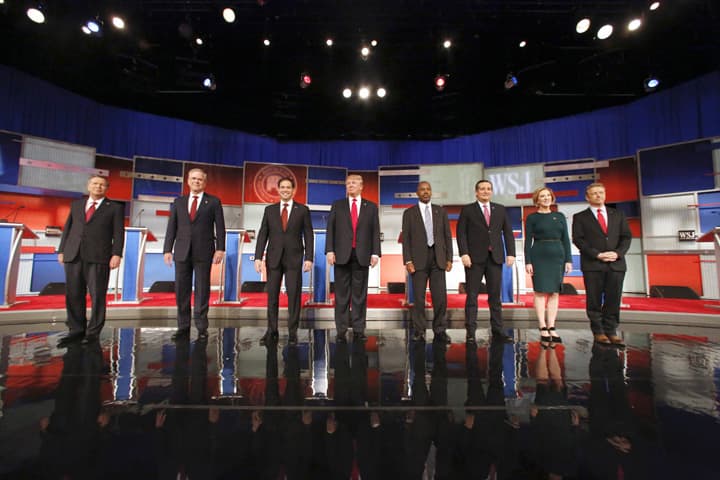Advertisement
The New Face Of Big Money Politics
After the GOP debate, a look at the power and limitations of money and super PACs in presidential politics this season.

A GOP debate last night, and we will look at it. Immigration The economy. What it means to be a conservative. To be Ben Carson. But there’s more going on than what’s on the stage. It’s what’s in the bank. In campaign coffers and super PACs. Millions. Hundreds of millions. Money is not everything this time out. Bernie Sanders does not have a super PAC. Neither does Trump. Of course, he’s a billionaire. Jeb Bush has a heap of dough and he’s trailing. And yet money keeps talking, and in new ways. This hour On Point, a check-up on money and super PACs in the 2016 campaign.
-- Tom Ashbrook
Guests
Lisa Lerer, national politics reporter for the Associated Press. (@llerer)
Matea Gold, national political reporter for the Washington Post, covering money and influence. (@mateagold)
Robert Maguire, political non-profits investigator for the Center for Responsive Politics. (@RobertMaguire_)
Lawrence Lessig, Roy L. Furman professor of law and leadership at the Harvard Law School and former Democratic candidate for President. (@lessig)
From Tom’s Reading List
Washington Post: Cruz’s quiet fundraising strength: A network of wealthy donors — "For all his bashing of 'billionaire Republican donors' who 'actively despise our base,' the anti-establishment senator from Texas is being bolstered by his own robust base of wealthy contributors. Cruz raised $5.2 million through the end of September from supporters who gave him the $2,700 maximum — making him No. 2 in the GOP race for large donors, after former Florida governor Jeb Bush, according to an analysis by the nonpartisan Campaign Finance Institute."
TIME: Is a Pro-Bush Super PAC Obscuring Its Spending? -- "Super PACs are supposed to be both transparent and independent from the politicians they are supporting. But it’s not clear that Right to Rise USA, the super PAC formed by Republican Jeb Bush prior to his presidential bid, is either."
New York Times: A New Low in Campaign Finance — "Election-related spending by groups that don’t disclose their donors has grown exponentially in the last few years, thanks in part to the Supreme Court’s 2010 ruling in Citizens United v. F.E.C. The expenditures reported by these groups rose from just under $6 million in 2004 to $308 million in the last presidential election. This time around, that spending is already at $4.9 million, more than tenfold what it was at the same time in the 2012 cycle. And that doesn’t include the significant chunks of political spending that go unreported."
This program aired on November 11, 2015.